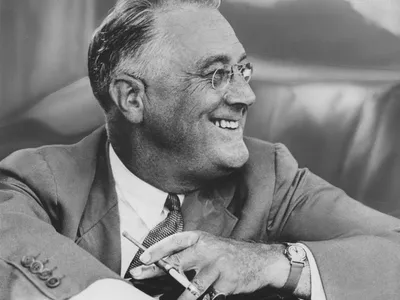
The Man Who Broke the Rules and the Country Let Him
When people hear that Franklin D. Roosevelt served four terms as U.S. president, the usual reaction is:
“Wait… isn’t that illegal?”
Today, yes. But back then? Not at all. So how did this happen — and why did Americans keep voting him back in?
Let’s break it down.
1. No Term Limits Back Then
First of all, before the 22nd Amendment, the U.S. Constitution didn’t limit how many times a president could be elected.
George Washington had set a tradition by stepping down after two terms — but it was just that: a tradition. Not a law.
FDR came in at a time when the country wasn’t looking for tradition it was desperate for stability.
2. The Great Depression & A New Kind of Leadership
When Roosevelt was first elected in 1932, the U.S. was drowning in the Great Depression. Banks had collapsed, millions were unemployed, and people had lost faith in the government.
FDR came in with a promise: “A New Deal.”
He introduced relief programs, public works jobs, and banking reforms. It wasn’t perfect — but it gave people hope.
By 1936, Americans didn’t want change. They wanted the guy who was doing something. So, he won again.
3. Then Came World War II…
Just when the U.S. started finding its footing, World War II hit. Suddenly, the stakes were global.
By 1940, Americans were saying:
“We’re not switching leaders mid-crisis.”
That’s why he ran for a third term. And in 1944, with the war still raging, he ran for a fourth.
4. So… Why Don’t Presidents Serve 4 Terms Now?
Because after FDR, Congress said: Never again.
In 1951, the 22nd Amendment was passed, officially limiting U.S. presidents to two terms.
It was a reaction to FDR’s legacy; not out of hate, but out of fear of too much power staying in one person’s hands.
Final Thought: Did America Regret It?
Despite controversy, FDR remains one of the most influential presidents in history.
Some loved him. Others feared the power he held. But one thing is clear:
He led through two of the darkest chapters in U.S. history and Americans trusted him to finish what he started.








